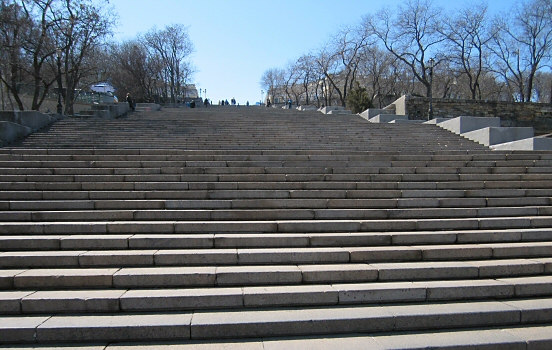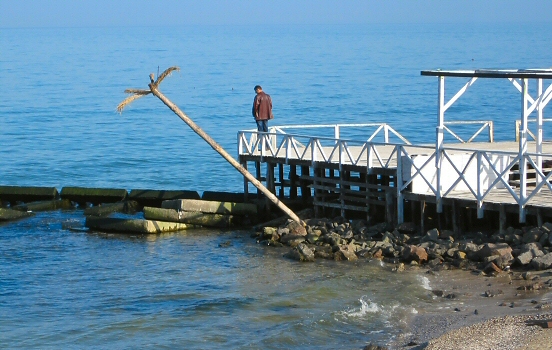There’s something about a city perched on the edge of a continent, staring out at the dark oily sea from the faded grandeur of its baroque facades. Odessa is one of those places.
Odessa doesn’t hide the years. It flaunts them like scars from a bar fight it probably started. As I walked along the magnificent boulevards, my thoughts went to its history.
The city in southern Ukraine was founded by Catherine the Great in 1794, built on the foundation of previous settlements of Greeks, Tatars and Ottomans. It is said to be constructed as a bragging point, trying to create a new Saint Petersburg in the sunny south.
Regardless of the intentions, the architecture is stunning with a lot of European influences. There is a cosmopolitan nature which makes it feel very different to Kiev.
 Going down the Potemkin Stairs in Odessa.
Going down the Potemkin Stairs in Odessa.
The most striking view of Odessa is of course the Potemkin Stairs. Finished in 1841, the 142 meters long stairway was immortalized in Sergei Eisenstein’s movie The Battleship Potemkin from 1925, where the granite steps bear witness to the unforgettable slaughter scene where Odessan citizens were murdered, inspired by a real event in 1905.
At the top, a statue of the Duke of Richelieu stands like a weird French guardian over the city, dressed in a toga for reasons nobody can explain without vodka.
Mark Twain was here in 1867 and described it like this in his book The Innocents Abroad published two years later:
“A vast flight of stone steps led down to the harbor–two hundred of them, fifty feet long, and a wide landing at the bottom of every twenty. It is a noble staircase, and from a distance the people toiling up it looked like insects.”
— Mark Twain (1867)
 “Old Man and the Black Sea”.
“Old Man and the Black Sea”.
Since the city is called “pearl of the Black Sea”, I knew where to go next. Passed the statue of Alexander Pushkin, who was exiled here in 1823, and had a brief pit stop for a cold bottle of Lviv before arriving at the waterfront of the Black Sea.
Walked along the sandy beach and sat down on the pier, overlooking the distant horizon across the Black Sea. Odessa feels like the place of exiled poets, of sailors with busted knuckles, of citizens who’ve seen empires come and go from their kitchen windows and never missed a step.

Comments
No comments yet.
Leave a reply